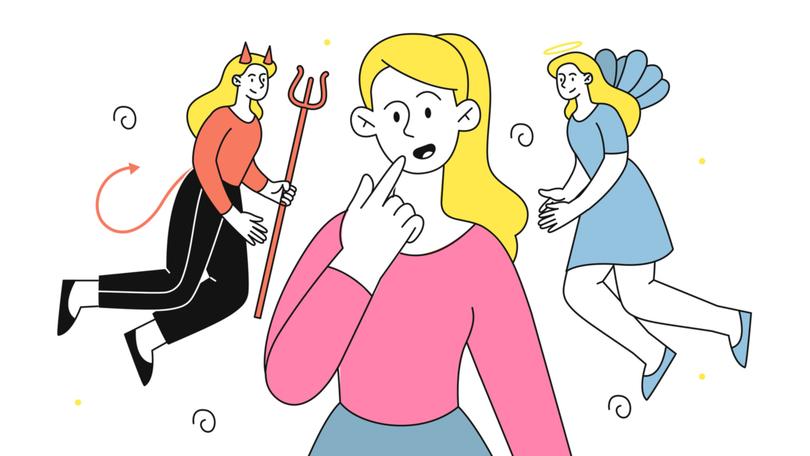ANNA MATHUR: How to beat Good Girl Syndrome — just accept that some people will never like you

As children – and this is especially true of girls – we are praised for being kind, for helping out, for being accommodating.
Carrying those traits into adulthood earns us further validation. Being the woman your friends, your boss, your colleagues know will say ‘Yes’ to everything helps you get on in life. Things just feel easier if people like you.
And so, ‘people pleasing’ becomes a personality trait; one you keep reinforcing, no matter how much pressure that heaps on you, no matter how loud that inner voice says: ‘I don’t have the capacity for this.’
Sign up to The Nightly's newsletters.
Get the first look at the digital newspaper, curated daily stories and breaking headlines delivered to your inbox.
By continuing you agree to our Terms and Privacy Policy.The video player is currently playing an ad. Skip Ad
You ignore it, because all that matters is maintaining your ‘Good Girl’ image. Until, eventually, you break.
Trust me, I should know.
When clients describe their pathological need to be perfect, to not let anyone down, and to be liked by all, I nod in recognition.
So-called Good Girl Syndrome is debilitating. Three years ago it saw me so burnt out that, for a while, I could barely function. I wasn’t able to tell my husband what I wanted to eat for dinner; to engage with my children; to even pick up my phone.
All I wanted to do was lie on the sofa. My nerves felt so exposed, it was as though I’d lost my skin.
Until then I had been saying ‘Yes’ to every request, no matter what that cost me.
In my pursuit of constant approval, I’d been giving myself away as if I were an endless resource.
Now, I had nothing left to give. It was a scary but vital wake-up call. I needed to mark boundaries; it was time to start saying ‘No’.
Anyone who suffers from Good Girl Syndrome will baulk at the idea of doing that – or anything else that means other people might become anything less than delighted with you. The thought that someone might not like you, or ‘get’ you, or think wholly good things about you can trigger a visceral response.
Sensing incoming disapproval prompts panic, deep feelings of shame and desperation to turn things around so that person changes their opinion of you. But that isn’t a good way to live.
Because the uncomfortable truth is that some people don’t like you. For some, it’s something you did or didn’t do. Others can’t put their finger on why they don’t like you – they just don’t, and no amount of pleasing or pleading on your part will change that.
And that’s OK. My work as a psychotherapist is about encouraging clients to stop fearing how much lies outside the realm of our control. And to realise that our greatest fear – that the people who matter most to us will abandon us if we show our real, non-people-pleasing selves – is unfounded. Instead, once you stop trying to constantly please others, life improves.
It’s a message I share in my book, The Uncomfortable Truth, and in my discussion with Mail columnist Bryony Gordon on her podcast The Life of Bryony.
On Monday we shared our own experiences of Good Girl Syndrome, and in today’s follow-up episode, we’ll hear from listeners about their own struggles. And now I want to show you how, by accepting five hard truths, you can stop living for others, and start pleasing yourself . . .
IT’S ACTUALLY OK TO DISAPPOINT PEOPLE
Baffling as this might sound, disappointing people is a really healthy thing to do. I’m not talking about going out of your way to let someone down.
If someone genuinely cares about you, then they can withstand a bit of disappointment
But if saying ‘Yes’ would mean prioritising someone else’s wishes over your own well-being – for example taking on a task at work when you’re already overstretched, or attending a friend’s party when you really need a quiet evening in – then it’s perfectly reasonable to put yourself first by saying ‘No’.
If someone genuinely cares about you, then they can withstand a bit of disappointment. You’re only infantilising them by assuming they can’t. So, rather than pretending that you’d be happy to do it, honestly explain your situation. But not overly so. After all, ‘No’ is a complete sentence. If you mean enough to them, they will get over it.
APPEASING PEOPLE WILL NOT MAKE THEM LIKE ME
We’ve all heard of the fight-or-flight response. It’s when, in a challenging situation, we either square up to our aggressor or emotionally freeze.
Yet there’s actually a third reaction in such situations, called the Fawn Response. This is where you butter up the person making you feel threatened in an attempt to make them like you.
I did this with a girl at university, who I sensed was constantly annoyed with me. Yet no matter how much I sucked up to her, nothing worked. I’d lie there at night racking my brains as to what I might have done or said.
Eventually, during a night out involving several drinks, she confessed that she didn’t like me because I reminded her of her horrible cousin.
The root of the problem had nothing to do with me, which is so often the case.
If someone doesn’t like you, rather than desperately trying to rectify the situation, try and make peace with it. If they’ve already made their mind up about you, then wasting energy trying to change it becomes a draining and fruitless task.
I’M NOT RESPONSIBLE FOR OTHERS’ FEELINGS
One of the most transformative things that helped me break out of Good Girl Syndrome was realising that I am not responsible for other people’s feelings.
I’m responsible for my own behaviour – for not being cruel or unkind – but how someone feels as a result of me saying ‘No’ is for them to deal with, not me.
Yes, someone might feel hurt when a decision you make doesn’t directly benefit them.
But if they behave badly as a result of that, causing conflict or upset, then that’s entirely down to them.
And if someone is hurt because of you, and you’re not aware of it, then it’s their responsibility to either tell you or let it go.
BEING HONEST DOESN’T MAKE ME ‘DIFFICULT’
Being a Good Girl often manifests as pretending to be someone you’re not.
You say you like foods you can’t stand; you hum along to music you don’t like. I’ve even known women carry on answering to their name being mispronounced, not wanting to correct the person doing it. We do all this to avoid being seen as ‘difficult’, or potentially causing offence. Ultimately, the underlying fear here is one of rejection.
But isn’t it better to be your authentic self? And not just for your own sake. The person you’re giving a false impression to surely deserves to be allowed to know the real you.
I DESERVE TO PUT MY OWN NEEDS FIRST
The times I’ve been at my most pleasing to the world are also the times I’ve felt the most suffocated and low. Being a Good Girl means doing things you don’t really want to do.
It sees you saying things you don’t really mean. It requires you to suppress your own needs and emotions so that you can attend to everyone else’s.
Saying ‘No’ is hard at first. But with practice, it gets easier.
You see how the world keeps spinning, people don’t turn away from you and those feelings of being constantly overwhelmed start to abate.
You also discover that not being a Good Girl doesn’t automatically make you a Bad Girl. You simply find the freedom to be your authentic self – a woman whose wants and needs you’re allowed to prioritise.
Which is exactly what you deserve.
